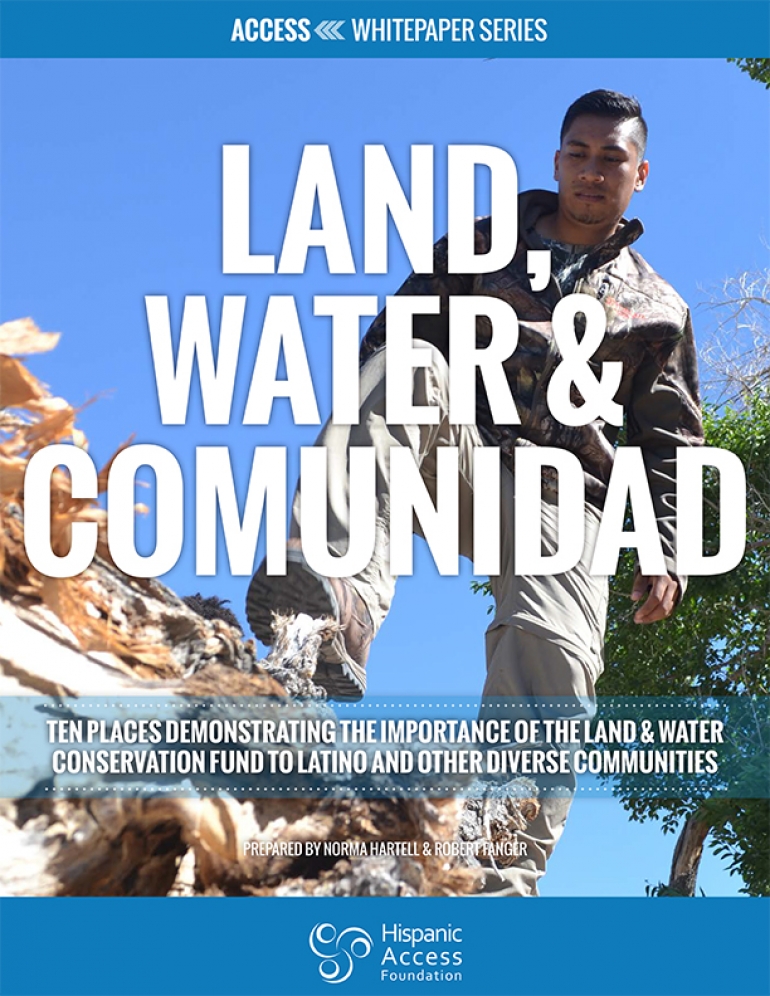LWCF began more than 50 years ago as a bipartisan promise that has been instrumental in creating, protecting and providing access to public lands not just for the Latino community, but also for every American across the nation – and at no cost to taxpayers. Its funding has touched nearly every county in the country and has been one of the most critical avenues in providing Latinos, low-income families, rural and urban communities with access to the outdoors.
LWCF is funded through oil and gas royalties, which is capped at $900 million annually. However, because Congress must authorize and allocate funds to the program each year, the LWCF has only been fully funded twice in its 54-year history and in total has only received about 46 percent of the funds promised. When it originally passed in 1964, it was done so for a 50-year period. When it expired and came up for reauthorization in 2015, Congress temporarily addressed the issue by reauthorizing for a short 3-year period, leaving it to expire September 30, 2018. Without this program’s existence, current and future protected lands and water sources would be left without the financial resources to remain protected and maintained.
Numerous polls show that Latinos prioritize the protection of open space, lands, waters and parks for future generations. Local economies benefit from consistent tourism and recreational visitors. The loss of the LWCF puts at risk the many workers, students, and Latino families that depend on the recreational and tourism industries for their livelihood. As parks face the threats of development, which in turn could jeopardize the historical, economical and cultural ties we maintain with these resources, it’s vital to have all local communities engaged in the dialogue around balancing development with conservation for the future. Congress can certainly help by ensuring permanent reauthorization of LWCF and allocating the full funding to the program.
This report assesses ten locations (in no particular order), plus a bonus site, and demonstrates the importance and connection for Latinos, urban, rural and low-income communities,– providing access to the outdoors for every congressional district and nearly every American. These sites include:
#1: BILL BAGGS CAPE FLORIDA STATE PARK (FLORIDA)
Off the coast of Miami, this island park helps preserve diverse ecology, while providing locals with a place to recreate through biking, hiking and kayaking.
#2: ROBERTO CLEMENTE STATE PARK (NEW YORK)
In the heart of the Bronx, this park provides the diverse urban community with a shared community space the promotes sports and recreation.
#3: APODACA PARK (NEW MEXICO)
One of the largest city parks in Las Cruces, this park is the hub of activity from birthday parties to soccer games and provides the community with great outdoor amenities.
#4: CHINO HILLS STATE PARK (CALIFORNIA)
This park provides an array of outdoor activities for millions of people in Southern California and helps its visitors unplug from city life and connect with nature.
#5: SPRING MOUNTAIN RANCH STATE PARK (NEVADA)
In the desert community of Las Vegas, this state park provides a unique green space against a red-rocked backdrop that the community can use for picnics, sports and gatherings.
#6: JOHN HEINZ NATIONAL WILDLIFE REFUGE (PENNSYLVANIA)
This refuge, which protects a vital tidal basin, resides in Philadelphia and provides easy access to the outdoors for the city’s diverse communities.
#7: ART DAGUE POOL AND WATERSLIDE (COLORADO)
In rural cities like Rifle, the availability of community amenities may be lacking, but this city pool provides its youth with a place to stay active and connect with friends.
#8: JOSE MARTI RIVERFRONT PARK (FLORIDA)
This Miami park not only provides the city community with outdoor space, but it also help to celebrate the cultural heritage for many in the community.
#9: SAND TO SNOW NATIONAL MONUMENT (CALIFORNIA)
This monument provides greater access for hunters and recreationists to public lands in the California desert.
#10: AZTLAN PARK (COLORADO)
This neighborhood park provides a hub for recreation, gathering and connecting in this Denver community with a growing and diverse Latino population.
BONUS: EVERGLADES NATIONAL PARK (FLORIDA)
Like other national parks, Everglades benefits from LWCF support. From maintenance and restoration to acquiring land, the fund is a critical resource for these national gems.
LWCF has touched the lives of so many across the nation – you likely live mere minutes from a site supported by it. To let such a valuable and effective conservation tool expire would be a tragedy that would reverberate through future generations. LWCF represents a promise to the American people to conserve our public lands and water resources and ensure that everyone has access for generations to come. Let’s make sure we keep that promise. IT’S TIME FOR LWCF TO BE PERMANENTLY REAUTHORIZED AND FULLY FUNDED.

